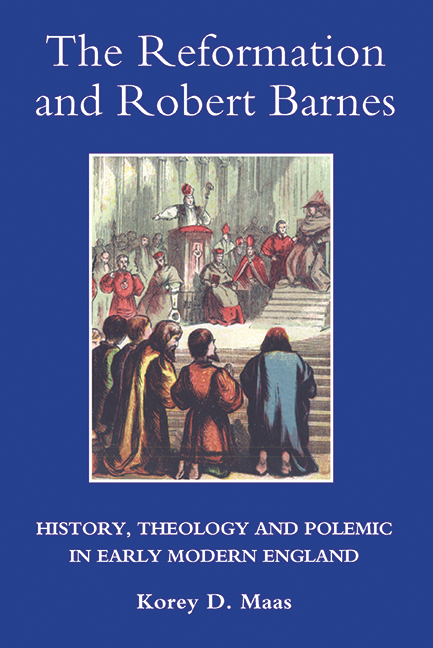Book contents
- Frontmatter
- Contents
- Dedication
- Acknowledgments
- Abbreviations and short titles
- Introduction
- Part I The Life and Theology of Robert Barnes
- Part II Barnes's Programme: History, Theology, and Polemic
- 3 History in Theology: Sentenciae and Supplications
- 4 Theology in History: Vitae Romanorum Pontificum (1536)
- 5 The Historical-Theological Programme of Robert Barnes
- Part III The Reception and Revision of Barnes's Programme
- Bibliography
- Index
- Miscellaneous Endmatter
5 - The Historical-Theological Programme of Robert Barnes
from Part II - Barnes's Programme: History, Theology, and Polemic
Published online by Cambridge University Press: 11 May 2017
- Frontmatter
- Contents
- Dedication
- Acknowledgments
- Abbreviations and short titles
- Introduction
- Part I The Life and Theology of Robert Barnes
- Part II Barnes's Programme: History, Theology, and Polemic
- 3 History in Theology: Sentenciae and Supplications
- 4 Theology in History: Vitae Romanorum Pontificum (1536)
- 5 The Historical-Theological Programme of Robert Barnes
- Part III The Reception and Revision of Barnes's Programme
- Bibliography
- Index
- Miscellaneous Endmatter
Summary
The emphasis of the previous two chapters has been placed on the manner in which Robert Barnes makes conscious and sustained use of historical sources and historical arguments in what is primarily a theological polemic. On the basis of the evidence there presented, it has become clear that his use of history is more than an afterthought or occasional whim; it is given a central place in his published works. As has been stressed by more than one commentator, however, evangelical appeals to history were neither inevitable nor logically necessary in the controversies of the sixteenth century. This is especially true in the case of reformers such as Barnes, who, with his strong Lutheran leanings, elevated the principle of sola scriptura to a place of unquestioned importance in his theology. In fact, in the light of a conservative insistence on the insufficiency of Scripture alone, and a corresponding emphasis on the authority of history and tradition as necessary complements to that of Scripture, any consistent evangelical reliance on historical argument might appear quite out of place. And indeed, some authors have asserted that such dual emphases are inherently self-contradictory.
Any attempt to summarise the character of Barnes's historical-theological programme must therefore give some focused attention to his conception of the nature and use of such potentially incompatible authorities. Coming to terms with Barnes's own understanding of these two authorities will then allow for some comparison of his programme with that of his contemporaries in England as well as on the continent. The conclusion reached by such comparison will finally allow for the formulation of a tentative answer to the question of whether Barnes's contributions to the doctrinal controversies of his day were particularly significant or in any way original.
History, theology, and authority
With regard to the question of theological authority, modern commentators have concluded that Barnes did indeed follow Luther and the majority of early evangelicals in confessing the unique status of Scripture. Neelak Tjernagel, for instance, asserts that Barnes viewed the Bible as ‘the only infallible source of religious knowledge’. Likewise, James McGoldrick has portrayed him as ‘an unswerving exponent of the Protestant principle of sola scriptura’. Nor are twentieth-century observers alone in having reached such conclusions. Already in the sixteenth century there were those who pronounced similar judgements.
- Type
- Chapter
- Information
- The Reformation and Robert BarnesHistory, Theology and Polemic in Early Modern England, pp. 137 - 164Publisher: Boydell & BrewerPrint publication year: 2010

